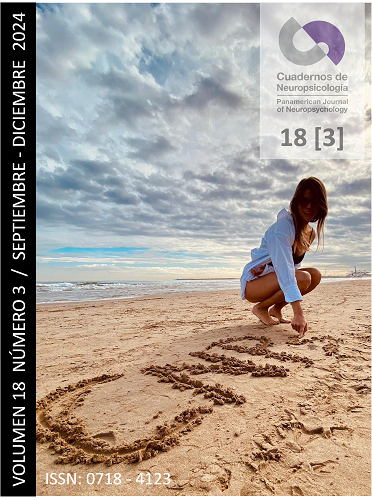Más allá de la recuperación: depresión, deterioro cognitivo leve y otros trastornos neuropsiquiátricos presentados en pacientes post-covid 19 en México
Abstract
RESUMEN
La infección por COVID-19 se ha asociado con diversas complicaciones neurológicas, psiquiátricas a corto y largo plazo, pero no se han descrito los trastornos específicos que presentan los pacientes recuperados de COVID-19. Nuestro objetivo es describir los trastornos neurológicos y neuropsiquiátricos específicos presentados por pacientes con antecedente de haberse recuperado de infección por COVID-19 en México. De 188 pacientes que acudieron a consulta de neurología en las primeras 6 semanas posteriores de haber padecido COVID 19 de abril-septiembre de 2022, se realizó una base de datos de 32 pacientes que acudieron por quejas cognitivas o afectivas; realizamos abordaje de su queja hasta llegar a un diagnóstico. Se encontró que la mayoría de los pacientes con queja afectiva fueron mujeres con una mediana <50 años, los pacientes con queja cognitiva la mayoría fue hombres con mediana >65 años. El trastorno afectivo más encontrado fue la depresión mayor, similar a lo descrito en la literatura y el trastorno cognitivo más común fue el Deterioro Cognitivo Leve, lo cual no se había descrito con anterioridad.
Palabras Clave: COVID 19, síndromepost-COVID, Trastornosneuropsiquiátricos, Deterioro cognitivo Leve, secuelas neuropsiquiátricas.
ABSTRACT
COVID-19 infection has been associated with various short- and long-term neurological, psychiatric complications, but the specific disorders presented by patients recovered from COVID-19 have not been described. Our objective is to describe the specific neurological and neuropsychiatric disorders presented by patients with a history of having recovered from COVID-19 infection in Mexico. Of 188 patients who attended the neurology clinic in the first 6 weeks after having suffered from COVID 19 from April to September 2022, a database of 32 patients who attended for cognitive or affective complaints was made; We approach your complaint until we reach a diagnosis. It was found that the majority of patients with affective complaints were women with a median <50 years, the majority of patients with cognitive complaints were men with a median >65 years. The most common affective disorder was major depression, similar to that described in the literature, and the most common cognitive disorder was Mild Cognitive Impairment, which had not been previously described.
Keywords: COVID 19, post-COVID syndrome, Neuropsychiatric disorders, Minor Cognitive Disorder, neuropsychiatric sequalae.
RESUMO
A infecção por COVID-19 tem sido associada a várias complicações neurológicas e psiquiátricas a curto e longo prazo, mas os distúrbios específicos apresentados pelos pacientes recuperados de COVID-19 ainda não foram descritos. Nosso objetivo é descrever os distúrbios neurológicos e neuropsiquiátricos específicos apresentados por pacientes com histórico de recuperação da infecção por COVID-19 no México. De 188 pacientes que procuraram atendimento neurológico nas primeiras 6 semanas após terem sofrido de COVID-19, entre abril e setembro de 2022, foi criada uma base de dados com 32 pacientes que procuraram atendimento por queixas cognitivas ou afetivas; realizamos a investigação dessas queixas até chegarmos a um diagnóstico. Observou-se que a maioria dos pacientes com queixas afetivas eram mulheres com uma mediana de idade <50 anos, enquanto a maioria dos pacientes com queixas cognitivas eram homens com uma mediana de idade >65 anos. O transtorno afetivo mais comum foi a depressão maior, similar ao descrito na literatura, e o distúrbio cognitivo mais frequente foi o Comprometimento Cognitivo Leve, o que não havia sido descrito anteriormente.
Palavras-chave: COVID-19, syndrome pós-COVID, transtornos neuropsiquiátricos, Comprometimento Cognitivo Leve, séquelas neuropsiquiátricas.
Downloads
How to Cite
Issue
Section
License
Articles published in this journal are protected under the Creative Commons Attribution-NonCommercial-ShareAlike 4.0 International (CC BY-NC-SA 4.0) license. This means that authors retain full rights over their research and publications at all times. As a journal, we fully respect and promote the principles of open access established by this license, allowing the work to be shared, adapted, and distributed for non-commercial purposes, provided that appropriate credit is given to the authors and any derivative works are licensed under the same terms.
Authors are responsible for obtaining the required permission when they wish to reproduce part of the material (figures, etc.) from other publications.
Likewise, CNPs allows authors to host in their personal sites or other repositories that they deem convenient the Final and Definitive Version of the published article with the format assigned by the journal. In no case do we allow access to preprints of the article under evaluation or already published.
When submitting an article to CNPs you are aware that all the contents of CNPs are under a Creative Commons License. In which it is allowed to copy and share the contents freely, always making reference to the origin of the publication and its author.












